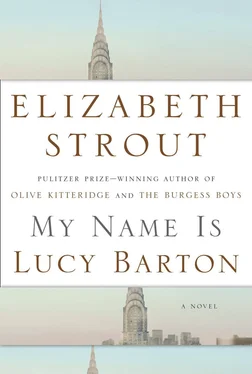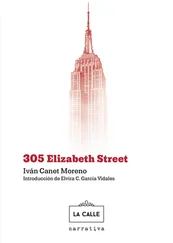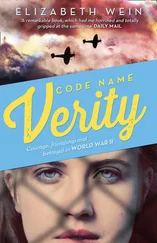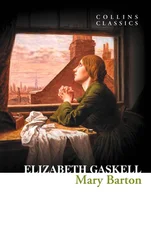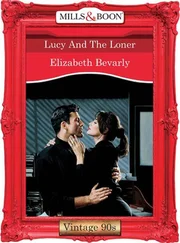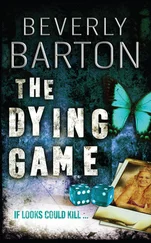“Nice?” I didn’t think she looked nice; she looked something, but I would not have said “nice.”
“No, not nice,” said my mother. “Something. She looks something.”
I stared at the picture again. She was next to her new boyfriend, an actor from a television series my husband watched some nights. “She looks like she’s seen stuff,” I finally said.
“That’s it,” my mother nodded. “You’re right, Wizzle. That’s what I thought too.”
The article was a long one, and it was more about Annie Appleby than the fellow she was with. It said that she’d grown up on a potato farm in the St. John Valley in Aroostook County in Maine, that she had not finished high school, that she had left to join a theater company, and that she missed her home. “Of course I do,” Annie Appleby was quoted as saying, “I miss the beauty every day.” When asked if she wanted to go into movies instead of staying on the stage, she answered, “Not a bit. I love the audience being right there, although I don’t think about them when I’m onstage, I just know what they need, which is for me to be good at my job of acting for them.”
I put the magazine down. “She’s pretty,” I said.
“I didn’t think she was pretty,” my mother said. It seemed a while before she added, “I think she’s more than pretty. She’s beautiful. I wonder what it’s like for her to be famous.” My mother seemed to be pondering this.
Maybe it was because for the first time since she had been here she had mentioned my father, and not just his truck, or maybe it was because she had called someone else’s daughter beautiful, but I said with some sarcasm, “I didn’t know you ever cared what it felt like for anyone to be famous.” Right away I experienced a terrible feeling: This was my mother, who had found her way to the basement just the night before, all the way to the basement of this big awful hospital in the nighttime, she had gone to make sure her daughter was okay, and so I said, “But I’ve wondered sometimes, because once I saw”—and I named a famous actress—“in Central Park, and she was walking along, and I thought, What is that like?” I said all this as a way of being nice to my mother again.
My mother nodded just slightly, looking toward the window. “Dunno,” she said. A few minutes later, her eyes were closed.
Not until long after did I think that she might not have known the famous actress I mentioned. My brother said, many years later, that she had never been to a movie that he knew of. My brother has never been to a movie either. About Vicky, I don’t know.
I saw the artist I had known in college a few years after I left the hospital, at an opening for another artist. It was a bad time in my marriage. Things had occurred that humiliated me; my husband had become very close to the woman who had brought my girls to the hospital and who had no children of her own. I had asked that she no longer come to our home, and he agreed. But I am quite sure we had an argument that night we went to the opening. And I remember that I did not change my top. It was a purple knit top, and I wore it with a skirt and I put on my husband’s long blue coat at the last minute; my husband must have worn his leather jacket. I remember I was surprised to see the artist there. He seemed nervous to see me, and his eyes went over my purple knit top and the navy blue coat — they both fit me poorly, and the colors didn’t go together; I did not see this until I got home and looked in the mirror and saw what he had seen. It didn’t matter. My marriage mattered. But seeing the artist that night mattered enough that so many years later I can still picture the long blue coat and my garish purple top. He was still the only person who made me self-conscious about my clothes, and that — to me — was curious.
—
I have said before: It interests me how we find ways to feel superior to another person, another group of people. It happens everywhere, and all the time. Whatever we call it, I think it’s the lowest part of who we are, this need to find someone else to put down.
The writer Sarah Payne, whom I had come across in the clothing store, was to speak on a panel at the New York Public Library. I read this in the newspaper a few months after I had seen her. I was surprised by it; she seldom appeared publicly, and I assumed she must be very private. When I mentioned this to someone who was said to know her peripherally, that person said, “She’s not so private, New York just doesn’t like her.” And it reminded me of the man who had spoken of her as a good writer except for her tendency toward the compassionate. I went to see her on this panel; William did not go with me, he said he would rather stay at home with the children. It was in the summer, and there were not nearly as many people as I had thought there might be. The man who had said that about her — the compassion business — was sitting alone in the back row. The panel was about the idea of fiction: what it was, and that sort of thing. A character Sarah Payne had written about in one of her books had referred to a former American president as a “senile old man whose wife ruled the country with her astrology charts.” Apparently Sarah Payne had received hate mail from people who said they had liked her book until they reached the part where this character referred to one of our presidents in this way. The moderator seemed surprised to hear this. “Really?” He was a librarian from the library. She said, “Really.” “And do you answer such letters?” The librarian asked this while his fingers, with a certain precision, touched the bottom of his microphone. She said that she did not answer them. She said, and her face was not as sparkling as it had been when I came across her in the clothing store, “It’s not my job to make readers know what’s a narrative voice and not the private view of the author,” and that alone made me glad I had come. The librarian seemed unable to understand. “What do you mean?” he kept saying, and she only repeated what she had said before. He said, “What is your job as a writer of fiction?” And she said that her job as a writer of fiction was to report on the human condition, to tell us who we are and what we think and what we do.
A woman in the audience raised her hand and said, “But do you think that about the former president?”
Sarah Payne waited for a moment, then said, “Okay, I’ll tell you this. If that woman I wrote about in a fictional way calls the man senile and old and says he has a wife who rules with her astrology charts, then I would say”—and she nodded her head tightly, and waited—“I, meaning me, Sarah Payne, citizen of this country, I would say, the woman I made up lets him off quite easily.”
New York audiences can be tough, but they understood what she meant, and heads nodded and people whispered things to one another. I looked behind me at the man in the back row, and he appeared to be without emotion. At the end of the night I heard him say to a woman who’d come to speak to him, “She’s always taken a stage well.” He did not say it nicely, is how I felt. And I took the subway home alone; it was not a night I loved the city I have lived in for so long. But I could not have said exactly why. Almost, I could have said why. But not exactly why.
And so I began to record this story on that night. Parts of it.
I began to try.
The night in the hospital when I felt I had been unkind to my mother by saying that I did not think she ever cared what it was like to be famous, I couldn’t fall asleep. I was agitated; I wanted to cry. When my own children cried I fell to pieces, I would kiss them and see what was wrong. Maybe I did it too much. And when I had had an argument with William, I sometimes cried, and I learned early that he was not a man who hated to hear a woman cry, as many men are, but that it would break whatever coldness was in him, and he would almost always hold me if I cried very hard and say, “It’s okay, Button, we’ll work it out.” But with my mother I didn’t dare cry. Both my parents loathed the act of crying, and it’s difficult for a child who is crying to have to stop, knowing if she doesn’t stop everything will be made worse. This is not an easy position for any child. And my mother — that night in the hospital room — was the mother I had had all my life, no matter how different she seemed with her urgent quiet voice, her softer face. What I mean is, I tried not to cry. In the dark I felt she was awake.
Читать дальше
